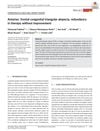 62 citations,
August 2018 in “Frontiers in Endocrinology”
62 citations,
August 2018 in “Frontiers in Endocrinology” Androgens are important for normal ovarian function and estrogen production, but may not be the main cause of follicle death.
 30 citations,
June 2021 in “British Journal of Dermatology”
30 citations,
June 2021 in “British Journal of Dermatology” Mutations in the WNT10A gene can cause skin, hair, teeth, and other disorders, and may also affect other areas like kidney and cancer, with potential for targeted treatments.
 28 citations,
January 2021 in “Parkinsonism & related disorders (Online)/Parkinsonism & related disorders”
28 citations,
January 2021 in “Parkinsonism & related disorders (Online)/Parkinsonism & related disorders” Parkinson's disease is linked to skin disorders and skin cells help in studying the disease.
 27 citations,
March 2018 in “Allergy and asthma proceedings”
27 citations,
March 2018 in “Allergy and asthma proceedings” People with alopecia areata often have higher rates of allergies and autoimmune diseases.
 27 citations,
October 2016 in “The Journal of Clinical Endocrinology and Metabolism”
27 citations,
October 2016 in “The Journal of Clinical Endocrinology and Metabolism” Daughters of women with PCOS generally experience normal puberty but may have more body hair and different body fat distribution.
 20 citations,
July 2009 in “Journal of Pediatric and Adolescent Gynecology”
20 citations,
July 2009 in “Journal of Pediatric and Adolescent Gynecology” Quick treatment of hair disorders in teenage girls is important because of the emotional effects.
 13 citations,
December 2001 in “Dermatologic therapy”
13 citations,
December 2001 in “Dermatologic therapy” Alopecia areata causes varying hair loss patterns, affecting hair, nails, and possibly glands, with treatment outcomes depending on disease duration and extent.
 12 citations,
May 2017 in “Pharmacology & therapeutics”
12 citations,
May 2017 in “Pharmacology & therapeutics” Targeting immune tolerance issues in Alopecia Areata could restore hair growth and maintain remission.
 5 citations,
October 2018 in “Dermatologic therapy”
5 citations,
October 2018 in “Dermatologic therapy” Recognizing congenital triangular alopecia is crucial to avoid unnecessary treatments.
 2 citations,
August 2023 in “Development”
2 citations,
August 2023 in “Development” Hair follicles in the back of the rosette fancy mouse have reversed orientations due to a gene mutation.
 January 2024 in “International Ayurvedic medical journal”
January 2024 in “International Ayurvedic medical journal” Certain Prakruti types are more prone to early male pattern baldness.
 August 2023 in “JOJ dermatology & cosmetics”
August 2023 in “JOJ dermatology & cosmetics” Antibiotics often cause skin reactions, making them a major health concern.

The document is a detailed guide on skin conditions and treatments for dermatologists.
 January 2019 in “Springer Reference Medizin”
January 2019 in “Springer Reference Medizin” Follicle Stimulating Hormone is important for fertility.
 January 2017 in “IMC Journal of Medical Science”
January 2017 in “IMC Journal of Medical Science” A rare endocrine disorder, APS 1, was diagnosed in a 26-year-old man in Bangladesh.
11 citations,
March 2021 in “Cleveland Clinic Journal of Medicine” Treating hair loss in both men and women is effective and improves quality of life.
 March 2024 in “Journal of cosmetic dermatology”
March 2024 in “Journal of cosmetic dermatology” Isotretinoin can effectively reduce symptoms of frontal fibrosing alopecia.
9 citations,
August 2021 in “Experimental dermatology” Hidradenitis suppurativa is a skin disease caused by the breakdown of the skin's natural immune barriers, especially around hair follicles.
 August 2024 in “Skin Research and Technology”
August 2024 in “Skin Research and Technology” Omega-6 and LDL cholesterol increase the risk of hair loss.
April 2024 in “Journal of clinical medicine” Classical PCOS types A and B are most common and linked to higher health risks.
 January 2024 in “Endocrine and metabolic science”
January 2024 in “Endocrine and metabolic science” Different types of PCOS need specific diagnosis methods and treatments.
 8 citations,
December 2022 in “Nature Reviews Endocrinology”
8 citations,
December 2022 in “Nature Reviews Endocrinology” Sex hormones' effects on COVID-19 are unclear and more research is needed to understand their potential as treatment.
 8 citations,
July 2022 in “Biomedicines”
8 citations,
July 2022 in “Biomedicines” Autophagy helps keep skin healthy and may improve treatments for skin diseases.
8 citations,
July 2020 in “Clinical, cosmetic and investigational dermatology” Excessive sun protection might cause frontal fibrosing alopecia by disrupting skin immune balance.
2 citations,
August 2021 in “Experimental and Therapeutic Medicine” Moxibustion may help improve ovarian function by changing androgen levels.
 January 2025 in “PROTEOMICS”
January 2025 in “PROTEOMICS” Drug repositioning is a promising way to quickly develop new treatments, especially for rare diseases.
 December 2024 in “Quality in Sport”
December 2024 in “Quality in Sport” Diet and lifestyle changes can help manage autoimmune diseases by reducing inflammation and supporting immune health.
 October 2023 in “Frontiers in Medicine”
October 2023 in “Frontiers in Medicine” Dupilumab helped a 4-year-old grow hair back after another treatment failed.
 November 2022 in “Arab Gulf Journal of Scientific Research”
November 2022 in “Arab Gulf Journal of Scientific Research” Taurine is important for many body functions and its deficiency can cause health problems.
 23 citations,
October 2018 in “Australasian Journal of Dermatology”
23 citations,
October 2018 in “Australasian Journal of Dermatology” The current understanding of frontal fibrosing alopecia involves immune, genetic, hormonal factors, and possibly environmental triggers, but more research is needed for effective treatments.

























